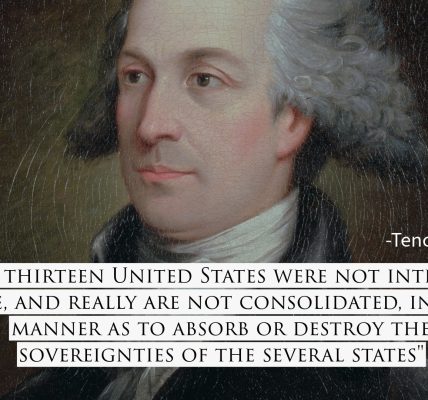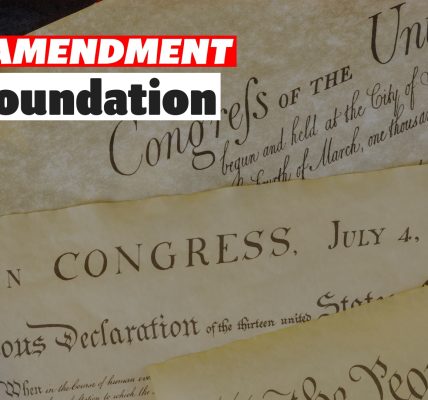Forget schoolhouse history. James Madison exposed a much deeper truth about the American Revolution. It wasn’t just “taxation without representation.” He argued that the real fight was over fundamental principles: the colonists’ right to local, self-government versus unlimited British power. This clash, Madison declared, was the “fundamental principle on which our independence itself was declared.”
The colonists thought the British were illegitimately altering the constitutional structure they had lived under for more than 100 years.
In his Report of 1800, James Madison explained the “fundamental principle of the Revolution” was that the colonies “were co-ordinate members with each other, and with Great-Britain; of an Empire, united by a common Executive Sovereign, but not united by any common Legislative Sovereign.” [Emphasis added]
In other words, Parliament had only limited power and was not the supreme legislative authority in the colonies.
From the time the first colonists arrived, this legislative authority was primarily vested in local elected bodies. As Madison put it, “The Legislative power was maintained to be as complete in each American Parliament, as in the British Parliament.”
In practice, power was supposed to be divided between colonial assemblies and Parliament. The local legislative bodies made laws concerning things of local concern. Parliament limited itself to legislating on issues relating to the empire as a whole, such as trade, war, and peace.
This division of power was later reflected in the American constitutional system as well.
Article II of the Articles of Confederation made this understanding explicit:
“Each state retains its sovereignty, freedom and independence, and every Power, Jurisdiction and right, which is not by this confederation expressly delegated to the United States, in Congress assembled.”
This same approach was brought forward to the Constitution for the United States.
As Madison described it in Federalist #45, the powers delegated to the federal government were “few and defined,” while the powers reserved to the states were “numerous and indefinite.” The general government was delegated powers that roughly correlated with Parliament’s, “exercised principally on external objects, as war, peace, negotiation, and foreign commerce.”
Beginning in the early 1760s Parliament set aside the constitutional precedent the colonists had lived under for more than a century, and started tearing down the historic division of power with a series of acts intended to establish internal taxes and raise revenue. This ramped up with the passage of the Stamp Act in 1765.
In effect, Parliament was asserting that the British Empire was one unified political entity with one central government.
The colonists rejected this idea, believing the colonies were bound together under the king, but politically autonomous in most cases. Parliament’s intrusion into issues historically left under the control of local legislatures was viewed as a usurpation of power, and a violation of the unwritten British constitution.
That’s exactly how Patrick Henry described it in his Virginia Resolves against the Stamp Act:
“Resolved, therefore, That the General Assembly of this Colony, together with his Majesty or his Substitutes, have, in their Representative Capacity, the only exclusive Right and Power to lay Taxes and Imposts upon the Inhabitants of this Colony: And that every Attempt to vest such Power in any other Person or Persons whatever, than the General Assembly aforesaid, is illegal, unconstitutional and unjust, and have a manifest Tendency to destroy British as well as American Liberty.”
Madison later said the right of the people of the states to interpose against such usurpations of power – or as he put it “to arrest the progress of the evil” – was “the fundamental principle on which our independence itself was declared.”
He went further to say this “political doctrine,” which he characterized as “the epoch of our revolution” formed “the basis of our republican constitutions.”
Madison summed up this “fundamental principle of the Revolution” that was carried over into the constitutional system this way:
“The authority of constitutions over governments, and of the sovereignty of the people over constitutions, are truths which are at all times necessary to be kept in mind; and at no time perhaps more necessary than at the present.”
In other words, the revolutionary and fundamental principle was that the people hold sovereignty – or final authority. The government, established by a constitution, is merely their agent, with only limited powers.
The British, of course, did not agree.
Colonial resistance forced the British to repeal the Stamp Act, but at the same time, also passed the Declaratory Act, asserting that it could make laws binding the American colonies “in all cases whatsoever.”
Madison asserted, “A denial of these principles by Great-Britain, and the assertion of them by America, produced the revolution.”
This clash over sovereignty not only resulted in the British losing their claim to power in “all cases whatsoever,” but in every other situation as well.
Madison summed it up like this:
“The assertion by G.B. of a power to make laws for the other members of the Empire in all cases whatsoever, ended in the discovery, that she had a right to make laws for them, in no cases whatsoever.”
It’s clear that the American Revolution wasn’t just about tea and taxes. It was about a fundamental disagreement over the very nature of government power.
The colonists risked everything to defend their right to local self-rule, a principle later enshrined in the Constitution as well. But how well are we, the inheritors of this revolution, doing in preserving that right?







